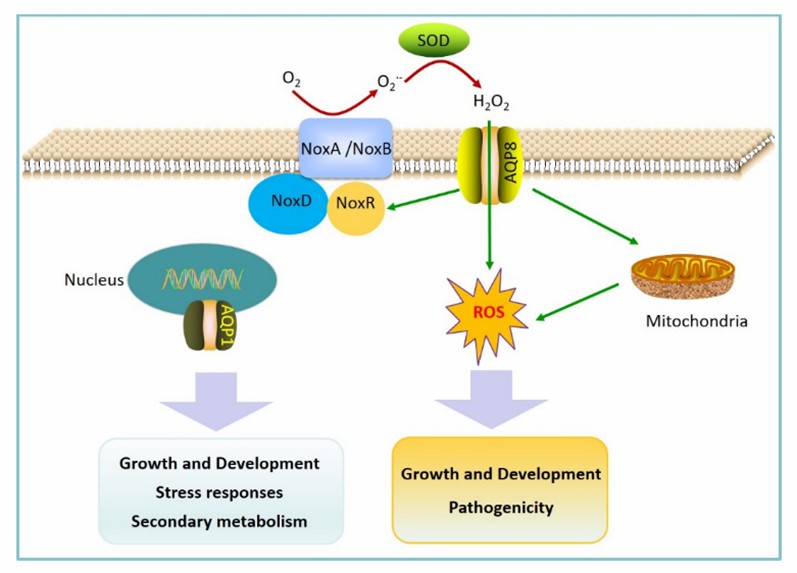Lifeasible helps research key factors in plant-pathogen interactions and provides services to help study the role of aquaporins.
Aquaporins (AQPs) are a group of small membrane channel proteins found in various organisms. Plant AQPs include five major families, found in the plasma membranes, tonoplast, and endoplasmic reticulum of plant cells. By transporting H2O2 across plasma membranes, plant AQPs play an essential role in mediating plant immunity. They can induce pathogen-associated molecular patterns (PAMP)-triggered immunity and activate systemic acquired resistance (SAR). Pathogens also have multiple AQPs, which are integral in pathogen growth and pathogenicity (Fig. 1). Pathogens use AQPs to regulate reactive oxygen (ROS) signaling to maintain their growth and enhance invasion. They also use AQPs to regulate the production of some secondary metabolites (effectors). There is an increasing focus on the role of AQPs in plant-pathogen interactions. Lifeasible offers services to help study the role of AQPs in plant-pathogen interactions.
 Fig. 1 A working model for the involvement of aquaporins in modulating pathogen pathogenicity (Li et al., 2020).
Fig. 1 A working model for the involvement of aquaporins in modulating pathogen pathogenicity (Li et al., 2020).
We help detect changes in identified AQPs in plant-pathogen interactions. We also help discover, validate, and study the function of new AQPs in plant-pathogen interactions.
Detection expression, transport activity, and regulating factors of identified AQPs
For AQPs that have been identified, we help to detect changes in their expression and function during pathogen infection to determine their potential role in plant-pathogen interactions. We measure expression based on qPCR methods and determine transport activity based on their ability to transport their substrates. We also help to identify factors that regulate the expression of AQPs and identify substances that influence the function of AQPs.
Identification of new AQPs
Any new AQPs are likely to be key targets related to plant-pathogen interactions. We can help explore plant and pathogen AQPs based on plant genomic and pathogen genomic information. Based on bioinformatics approaches, we help with transmembrane α-helices, subcellular localization, 3D homology models prediction, and stereochemical quality assessment to identify and characterize AQPs.
Preliminary studies on the role of new AQPs in plant-pathogen interactions
We help study the effect of plant AQPs on plant immunity. Through AQP inhibitors, gene editing, or RNA interference, we help design and construct experimental plants that functionally inactivate AQP, overexpress AQP, or suppress AQP expression. We then help to study changes in the ability of experimental and original plants to resist different pathogens.
We also help study the effect of pathogen AQPs on pathogen pathogenicity. We help construct AQP experimental pathogens based on similar methods to those used for AQP experimental plants. We then help to study changes in the ability of experimental and original pathogens to invade host plants.
Specific functional studies of new AQPs
We help conduct in-depth mechanistic studies for plant AQPs that contribute to plant resistance to pathogens and pathogen AQPs that contribute to pathogen invasion.
We help analyze the impact of altered function or expression of plant AQPs on the plant metabolome, transcriptome, or proteome to identify potential mechanisms. We help measure plant immunity (including H2O2-related immunity, PAMP-triggered immunity (PTI), systemic acquired resistance (SAR), and stomatal opening or closing) to determine the impact on various aspects of plant immunity. We help determine the subcellular localization and structure of AQPs to make initial inferences about their function. We can also use the heterologous expression to investigate the transporter function of new AQPs. We commonly use Saccharomyces cerevisiae for heterologous expression, which has proven especially useful for the functional analysis of aquaporins.
We help to analyze the impact of altered function or expression of pathogen AQPs on pathogen growth, development, metabolism, and virulence. For example, we help study the effects of AQPs on mycelial growth, spore germination, and effector content. For AQP transporter function studies, we also use the heterologous expression method.
The role of AQPs in plant-pathogen interactions involves a wide range of research. Lifeasible offers customized research services to help realize individual studies. Please contact us to customize the content of your AQP research.
References
Lifeasible has established a one-stop service platform for plants. In addition to obtaining customized solutions for plant genetic engineering, customers can also conduct follow-up analysis and research on plants through our analysis platform. The analytical services we provide include but are not limited to the following:
Get Latest Lifeasible News and Updates Directly to Your Inbox
Adaptive Evolutionary Mechanism of Plants
February 28, 2025
Unraveling Cotton Development: Insights from Multi-Omics Studies
February 27, 2025